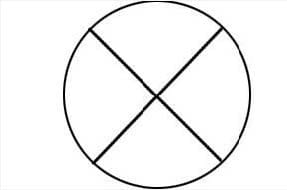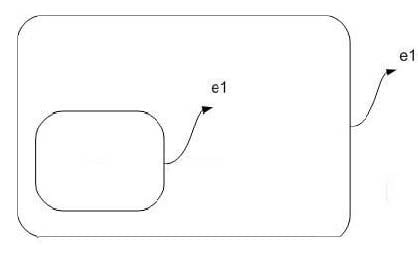OMG-OCUP2-INT200 Online Practice Questions and Answers
If the node in the exhibit receives a value, what happens to other values flowing in the diagram containing the node?

A. nothing
B. They stop for a time specified by the small circle.
C. They are aborted.
D. They stop until the small circle emits a value.
What is permitted for the profile mechanism?
A. creates new metamodels
B. removes existing metamodels
C. extends existing metamodels
D. changes existing metamodels
Triggers on two different transitions originating from two states at different levels of the same state are simultaneously enabled (as shown in the exhibit).

A. The state machine is not well-formed.
B. More deeply nested transitions take precedence over those with less depth.
C. Both transitions are taken in arbitrary order.
D. The less deeply nested transition takes precedence over those with more depth.
What is the difference between a stereotype and a metaclass?
A. Metaclasses can be specialized, but stereotypes cannot be specialized.
B. Stereotypes can be specialized, but metaclasses cannot be specialized.
C. A metaclass is a limited kind of a stereotype that can only be used in conjunction with one of the stereotypes it limits.
D. A stereotype is a limited kind of a metaclass that can be only be used in conjunction with one of the metaclasses it extends.
E. A stereotype is a specialization of a metaclass that can be used by itself, whereas a metaclass must be used with a stereotype.
What might a connector specify?
A. dependencies
B. classes
C. associations
D. messages
E. links
What does a run-to-completion processing for state machines mean?
A. Interrupts are disabled while the state machine is running.
B. No other event will be processed until the current event is fully processed.
C. The thread executing the state machine cannot be pre-empted by the scheduler.
D. The executions of orthogonal regions are serialized.
A protocol state machine can be used to describe which aspect of a component?
A. configuration of an assembly
B. external contract of a component
C. signal flow among connectors
D. internals of a component
Which is true of a provided interface associated with a port?
A. identifiers the services that the object owning the port expects of objects connected via that port.
B. represents an interface that must be defined within the classifier that owns the port
C. represents an interface that must be defined in the same package in which the classifier owning the port is defined
D. identifies the services that the object owning the port can offer to other objects connected via that port
Why are profiles NOT a first class extension mechanism?
A. They do not allow for modifying existing metamodels.
B. They do not permit customizing for domains, platforms, and methods.
C. They permit removing constraints that apply to existing metamodels.
D. They do not allow for modifying existing stereotypes.


